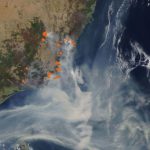 September 3, 2021 8:51 am
Published by Climate Extremes
September 3, 2021 8:51 am
Published by Climate Extremes
It has long been suggested in the literature, and discussed casually by meteorologists, that rainfall in Melbourne often occurs as lines of precipitation. However, this had yet to be quantified. CLEX researchers analysed 15 years of radar data from the Australian Radar Archive, using an objective method to identify and track these ‘linear systems’ based on radar reflectivity, size, and shape characteristics.
 February 12, 2021 11:35 am
Published by Climate Extremes
February 12, 2021 11:35 am
Published by Climate Extremes
CLEX researchers and colleagues quantified the air quality impact of the Black Summer bushfires of 2019/20 and COVID-19 in the south-eastern states of Victoria and New South Wales (NSW) using a meteorological normalisation approach.
 February 12, 2020 11:20 am
Published by Climate Extremes
February 12, 2020 11:20 am
Published by Climate Extremes
This work describes a new cross-scale modelling framework for urban environments and applies it to calculate how electricity and gas demand will change under future climate change and air conditioner (AC) ownership scenarios.
 September 2, 2019 3:37 pm
Published by Climate Extremes
September 2, 2019 3:37 pm
Published by Climate Extremes
Melbourne’s existing water supplies may face pressure if global warming hits the 2℃ level. The effects of drying and warming in southern Australia are expected to reduce natural water supplies. If we overshoot 2℃ of warming, even the desalination plant might not provide enough drinking water to a growing population.
 August 2, 2019 11:48 am
Published by Climate Extremes
August 2, 2019 11:48 am
Published by Climate Extremes
This was PhD student Charuni Pathmeswaran's first CLEX Winter School. It was an intense and challenging week, but it also gave her an opportunity to explore Melbourne. By week's end Charuni was motivated and had added a range of new skills she will apply to her research.
 February 5, 2019 3:31 pm
Published by Climate Extremes
February 5, 2019 3:31 pm
Published by Climate Extremes
Overall, the inaugural Australian Countdown finds that Australia is vulnerable to the impacts of climate change on health, and that policy inaction in this regard threatens Australian lives.
In a number of respects, Australia has gone backwards and now lags behind other high income countries such as Germany and the United Kingdom. Examples include the persistence of a very high carbon-intensive energy system in Australia, and a slow transition to renewables and low-carbon electricity generation.
 January 24, 2019 2:29 pm
Published by Climate Extremes
January 24, 2019 2:29 pm
Published by Climate Extremes
It’s normal for cities to be warmer than surrounding rural areas at night but researchers from the ARC Centre of Excellence for Climate Extremes at Monash University found heatwaves make this difference almost two and a half times greater under some heatwave conditions.
 July 10, 2018 1:19 am
Published by Climate Extremes
July 10, 2018 1:19 am
Published by Climate Extremes
Asthmatics and those affected by polluted environments living around major cities along Australia’s east coast could find life much harder over the next 50 years as stronger inversion layers caused by climate change trap more pollution.








